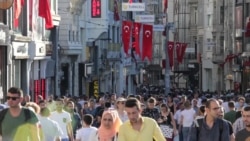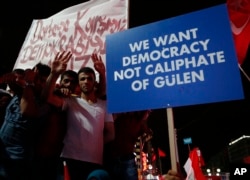The state of emergency that Turkish President Recep Tayyip Erdogan declared this week is giving him even more power to expand a purge that has seen an estimated 60,000 people either arrested or suspended from their jobs. Much of that purge has targeted members of a massive, wealthy and influential spiritual movement led by Fethullah Gulen, an former imam living in the U.S. state of Pennsylvania.
Gulen has not set foot on Turkish soil in 17 years, but his name evokes strong emotions among Erdogan supporters.
“We are here to care for Tayyip Erdogan. Let the angels take him under their wings, and Fethullah Gulen be damned,” said Songul Yildirim, a housewife attending a rally in support of the Turkish president in Istanbul.
The Turkish leader accuses Gulen of trying to set up a parallel state, and of being the force behind the failed coup.
Erdogan and Gulen were once allies, sharing what analysts say is a vision of soft Islamism to eventually replace Turkey’s secular state.
“Erdogan is a more traditionalist Islamist, whereas Gulen is more of the Suffi tradition,” said Claire Berlinski, an author who lived in Turkey and has written about Gulen and his movement. “They both shared the objective of wanting to replace the old guard with their own cadre of pious Anatolian civil servants, and then the falling out seems to have been a classic power confrontation.”
Hizmet power
As members of Gulen’s movement, also known as the Hizmet, or “service” movement, took posts in key sectors of education, military, intelligence, the judiciary, and especially the media, their power grew.
“That power in time caused these two partners a disagreement because Erdogan is not someone who likes to share his power with anyone,” said Nedim Sener, a writer in Istanbul who has researched the Gulenist movement for 16 years.
Penetrating the education sector was the key of Gulen’s strategy for more than four decades. His movement operates hundreds of schools in Turkey and overseas, many of them in the United States.
“Fethullah Gulen is a dangerous movement that takes a child from primary school and according to the child’s potential, determines whether he will be a soldier, an intelligence officer, a judge, all completely through the educational system that he has formed himself,” said Sener. “They act as if they are secular, as if they have nothing to do with this movement, while at the same time forming a sleeper cell,” he said.
That opinion is shared by Erdogan supporters and others in Turkey who have for years believed Gulen to be a dark force in their country’s politics.
The image is contrary to the perception of him in the United States, where newspaper op-eds have lauded him as a peacemaker. Some have compared him to the late American civil rights leader Martin Luther King, Jr.
There are no official figures of how many people belong to Gulen’s movement, but analysts estimate he has between 3 million and 6 million followers. They contribute between 10 and 20 percent of their monthly income. The movement is estimated to hold up to $50 billion in assets – virtually none of them in Gulen’s name.
Gulen in US
“Why did he go? It has nothing to do with his business activities,” said Sener, who was once jailed by a judge who was a follower of the Gulen movement. “Fethullah Gulen is like this. He sits very humbly on a couch, but wants the whole country under his feet,” he said.
Gulen left Turkey in 1999 saying he was seeking treatment for diabetes.
However, the U.S. decision to allow him to live on American soil has fueled speculation about alleged involvement in U.S. government activities. Newspapers in Turkey have for years played up reports that Gulen presented letters of reference from former CIA officials as part of his application for U.S. residency.
In Turkey, those in Gulen’s movement are reluctant to talk these days.
Erdogan’s crackdown has focused on institutions where Gulen is believed to exert influence through his followers, who tend to be highly educated and Western-savvy.
His brand of Islamism is attractive to many who want to live their Islamic faith in the modern world. “Gulen’s principles, such as respect for cultures, dialogue between religions, peace, education, health, humanitarian aid, volunteerism, that is the message,” said a Gulen follower who asked to remain anonymous. “At the end of the day, he is a man of religion. There is always a reference to religion in these messages,” the follower said.
The follower is a former journalist who worked for Zaman, one of the Gulen movement’s main newspapers that was seized by Erdogan’s security forces in March.
Like many in Turkey, he worries about the future.
“The main target of the state of emergency is the movement,” said the follower. “I’m afraid for all the opposition in Turkey. We are going into a very painful stage. From now on, those opponents, they will be devoid of their basic rights and freedom and they will be in danger for their lives and for their properties,” he said.







